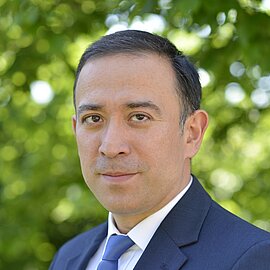The overall objective of the proposed session was to present and discuss research findings on issues of the Central Asian water and agricultural development by country- and region-specific experiences and lessons. The session comprised four presentations providing an overview of regional experience of restructuring agricultural production and the role of water in the regional agriculture at farm, inter-farm and regional levels.
Dr. Akmal Karimov (IWMI, Uzbekistan) gave a presentation on the role of water resources in the Central Asian agricultural development. Climate change will increase the pressure on agriculture to produce more with limited water resources. Population growth increases non-agricultural water use and reduces water available for crop cultivation. The situation is complicated due to transboundary nature of regional water resources resulting in water-for-food and water-for-energy nexus. Securing water for agriculture through increasing water use efficiency becomes important for Central Asian states. He pointed at the lessons from introducing the Integrated Water Resources Management (IWRM) in the Fergana Valley in 2000-2012 and water saving technologies at pilot farms.
Prof. Dr. Martin Petrick (IAMO, Germany) gave a presentation on the crop diversification as a climate risk mitigation strategy based on the farm-level evidence from Uzbekistan. The dominance of cotton in the irrigated areas of Central Asia has long been criticized for its ecological effects on salinization and desertification. From an economic point of view, the monocultures of two strategic crops - cotton and wheat - can limit farmers’ responses climate change and increase their vulnerability to water availability and crop failure. Crop diversification has been proposed as a strategy to mitigate these effects and provide alternative income generation channels. Using survey data to compare the production outcomes of farmers operating in two contrasting districts in Uzbekistan, he concludes that despite the high value crops are a profitable alternatives, absent connections to city markets and a lack of role models will likely impede a further expansion of crop diversification.
In the next presentation, Nozila Mukhamedova (IAMO, Germany) and Oyture Anarbekov (IWMI, Uzbekistan) presented their research findings on evolution and challenges of water users associations (WUAs) in Central Asia. After independence in 1991, the former Soviet Central Asian countries diverged in implementation of agricultural policies. Yet, all states after land reforms had to reorganize water management. The WUAs have been facing both old challenges - poor conditions and physical deterioration of water infrastructure and new challenges such as the rising number of farming units not aligned with hydraulic boundaries, increasing diversity of crop portfolio and its implication on irrigation schedule as well as mismatch between on-farm irrigation system and scale of inter-farm water operation. They conclude that the major constraints for the consistency and improved performance of water user groups are found in uneven implementation of water reforms and in some countries, reluctance to change within each country, weak legal basis for the responsibilities and water rights of WUAs, sustainability issues connected with water services pricing and inclusion and obligations of water users.
Finally, Dr. Maksud Bekchanov (IWMI, Sri Lanka) and Dr. Nodir Djanibekov (IAMO, Germany) presented the results of their studies on the issues of regional cooperation in water use to cope with water scarcity in the Aral Sea Basin. The regional water resources are of critical importance, but have diametrically opposed meaning for upstream and downstream economies. The conflicting interests of the riparian countries over water use are particularly strong in distributing water between irrigation and hydropower production. The cooperating riparian states thus face the problems of the selection of the optimal water use across two sectors and the allocation of the resulting net gains from water cooperation. By analyzing potentials for cooperative use of water and hydropower resources and through increasing water and energy use benefits for all nations, they conclude that the riparian states can yield significant economic benefits if they coordinate their water use compared to the current water allocation decisions.
Joint organized session by IAMO and IWMI at the IAMO Forum 2015
IAMO and International Water Management Institute (IWMI), Central Asia office organized a session entitled "Climate change, water resources and agricultural development in Central Asia" as part of the IAMO Forum 2015, Halle (Saale) Germany.

